#community publishing
Explore tagged Tumblr posts
Photo


I was very excited to be invited to design the cover(s) of Resonance’s New Poets Anthology earlier this year. Here’s the printed work. Having attended every open mic at both Three Hounds and Matchstick Piehouse I can confidently say Resonance is the best poetry night in London, some seriously incredible poets come through and there are often unbelievably good first-timers too. The energy in the room is always amazing, but on the launch night for the anthology it was like a sparkler you could taste on your tongue and feel at the end of your fingers, pure magic
#studyblr#studygram#studyspo#study#lit#literature#books#bookstagram#b#bookblr#litblr#poetry#poet#poems#anthology#community#publishing#community publishing#resonance#south east london#london#writing#writers#new poets#art#artwork#illustration#my work
207 notes
·
View notes
Text

1K notes
·
View notes
Text

"pinch estrogen" by silas denver melvin, published in the September 2024 issue of Ghost City Press
#silas denver melvin#sweatermuppet#ghost city press#poetry#poetblr#trans poetry#queer poetry#poetry community#published poet#poets of tumblr
854 notes
·
View notes
Text
Master Dialogue Writing Techniques for Engaging Fiction (For Writers)
(Beware, long post!)
As fiction writers, we all know that effective dialogue is essential for bringing our stories and characters to life. After all, the way our protagonists, antagonists, and supporting players speak to one another is one of the primary ways readers get to know them on a deep, intimate level. Dialogue reveals personality, uncovers motivation, and propels the narrative forward in a way that felt narration simply can't match.
But nailing natural, compelling dialogue is easier said than done. It's a craft that takes serious skill to master, requiring writers to have a keen ear for authentic speech patterns, a nimble handle on subtext and implication, and the ability to strike that delicate balance between being true to real-world conversation while also keeping things snappy, dynamic, and laser-focused on the story at hand.
If you're someone who struggles with crafting dialogue that truly sings, never fear. In this in-depth guide, I'm going to dive deep into the techniques and best practices that will help you elevate your dialogue writing to new heights. By the end, you'll have a toolbox full of strategies to ensure that every exchange between your characters is as gripping, revealing, and unforgettable as possible.
The Fundamentals of Effective Dialogue
Before we get into the more advanced nuances of dialogue writing, let's start by covering some of the foundational principles that all great fictional conversations are built upon:
Reveal Character One of the primary functions of dialogue is to give readers a window into who your characters are as people. The way they speak — their word choices, their tone, their body language, their turns of phrase — should provide vivid insight into their personalities, backgrounds, values, quirks, and emotional states.
Think about how much you can glean about someone just from how they communicate in real life. Do they use a lot of slang and shorthand? Are they verbose and flowery with their language? Do they struggle to make eye contact or fail to respond directly to questions? All of these subtle linguistic cues are powerful tools for crafting multi-dimensional characters.
Drive the Plot Forward While revelations about character are crucial, you also want to ensure that your dialogue is constantly pushing the story itself forward. Each exchange should feel purposeful, moving the narrative along by introducing new information, triggering plot points, creating conflict, or prompting characters to make pivotal decisions.
Dialogue that feels aimless or extraneous will ultimately bore readers and detract from the forward momentum of your story. Every line should have a clear intent or function, whether it's uncovering a hidden truth, setting up a future complication, or escalating the tension in a high-stakes moment.
Establish Distinct Voices In a story featuring multiple characters, it's crucial that each person has a clearly defined and differentiated way of speaking. Readers should be able to tell who's talking just from the rhythm, diction, and personality of the dialogue, without any additional context clues.
This doesn't mean every character has to have an over-the-top, hyper-stylized way of communicating. In fact, the most effective character voices often feel grounded and natural. But there should still be distinct markers — whether it's word choice, sentence structure, tone, or speech patterns — that make each person's voice instantly recognizable.
Convey Subtext While the literal words being spoken are important, great dialogue also traffics heavily in subtext — the unspoken emotional undercurrents, power dynamics, and hidden agendas that simmer beneath the surface of a conversation.
The most compelling exchanges happen when characters are communicating on multiple levels simultaneously. Perhaps they're saying one thing out loud while their body language and tone convey a completely different sentiment. Or maybe they're engaged in a subtle war of wits, trading verbal jabs that reveal deeper wells of resentment, attraction, or vulnerability.
Mastering the art of subtext is key to creating dialogue that feels layered, lifelike, and imbued with dramatic tension.
Strategies for Writing Snappy, Realistic Dialogue
Now that we've covered the foundational principles, let's dive into some specific techniques and best practices that will take your dialogue writing to the next level:
Omit Unnecessary Details One of the biggest mistakes many writers make with dialogue is bogging it down with too much extraneous information. In real life, people rarely speak in perfectly composed, grammatically correct full sentences. We stumble over our words, interrupt each other, trail off mid-thought, and pack our speech with filler words like "um," "uh," and "you know."
While you don't want to go overboard with mimicking that messiness, you should aim to strip your dialogue of any overly formal or expository language. Stick to the essentials — the core thoughts, feelings, and information being exchanged — and let the subtext and character voices do the heavy lifting. Your readers will fill in the gaps and appreciate the authenticity.
Master the Art of Subtext As mentioned earlier, crafting dialogue that's rich in subtext is one of the keys to making it feel gripping and lifelike. Think about how much is often left unsaid in real-world conversations, with people dancing around sensitive topics, conveying hidden agendas, or engaging in subtle power struggles.
To layer that sense of unspoken tension into your own dialogue, consider techniques like:
• Having characters contradict themselves or say one thing while their body language says another
• Utilizing loaded pauses, interruptions, and moments of uncomfortable silence
• Injecting subtle sarcasm, skepticism, or implication into a character's word choices
• Allowing characters to talk past each other, missing the unspoken point of what the other person is really saying
The more you can imbue your dialogue with that layered, emotionally-charged subtext, the more it will resonate with readers on a deeper level.
Establish Distinct Voices As mentioned earlier, ensuring that each of your characters has a clearly defined and differentiated speaking voice is crucial for great dialogue. But how exactly do you go about accomplishing that?
One effective strategy is to give each person a unique set of verbal tics, idioms, or speech patterns. Maybe one character is prone to long-winded, flowery metaphors, while another speaks in clipped, efficiency-minded sentences. Perhaps your protagonist has a habit of ending statements with questioning upticks, while the sarcastic best friend always punctuates their barbs with an eye roll.
You can also play with differences in diction, syntax, and even accent/dialect to further distinguish how your characters communicate. The key is to really get to know the unique personality, background, and psychology of each person — then let those elements shine through in how they express themselves.
Lean Into Conflict and Confrontation When it comes to crafting gripping dialogue, conflict is your friend. The most compelling exchanges often arise from characters butting heads, engaging in verbal sparring matches, or working through deep-seated tensions and disagreements.
Conflict allows you to showcase the high stakes, unresolved needs, and deeper emotional currents that are driving your characters. It forces them to make bold choices, reveals aspects of their personalities that might not otherwise surface, and generates the kind of dramatic tension that will really hook your readers.
Of course, you'll want to avoid making every single dialogue scene a full-blown argument. But learning to sprinkle in well-placed moments of friction, confrontation, and clashing agendas is a surefire way to elevate the energy and impact of your character interactions.
Read Your Dialogue Out Loud One of the most valuable tricks for ensuring your dialogue sounds natural and lifelike is to read it aloud as you're writing. Hearing the words out loud will quickly expose any clunky phrasing, overly formal grammar, or inauthentic rhythms that would otherwise go unnoticed on the page.
Pay close attention to how the dialogue rolls off your tongue. Does it have a smooth, conversational flow? Or does it feel stilted and unnatural? Are your characters' unique voices shining through clearly? Are there any spots where the back-and-forth starts to drag or feel repetitive?
Actively listening to your dialogue — and making adjustments based on how it sounds in the real world — is an essential part of the writing process. It's one of the best ways to refine and polish those character interactions until they feel truly alive.
Hopefully, this can help you all!
The key is to always keep your focus on authenticity. Ask yourself: how would real people actually speak?
Hey fellow writers! I'm super excited to share that I've just launched a Tumblr community. I'm inviting all of you to join my community. All you have to do is fill out this Google form, and I'll personally send you an invitation to join the Write Right Society on Tumblr! Can't wait to see your posts!

#writing#thewriteadviceforwriters#writeblr#creative writing#writing tips#on writing#writers block#how to write#writers and poets#writers on tumblr#authoradvice#author#fiction#indie author#writer#publishing#book writing#book quote#bookblr#books#writing advice#fiction writing#writing blog#writing tools#writing resources#novel writing#writer community#fantasy novel#readers#reading
829 notes
·
View notes
Text
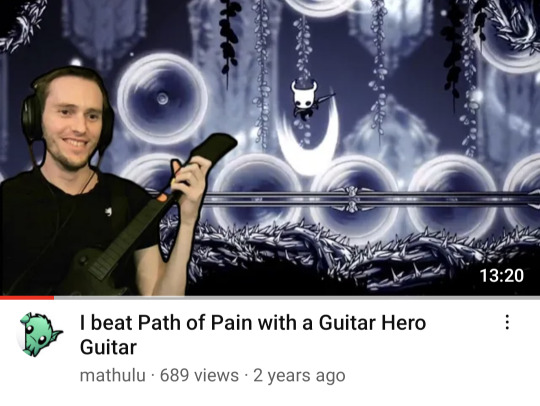


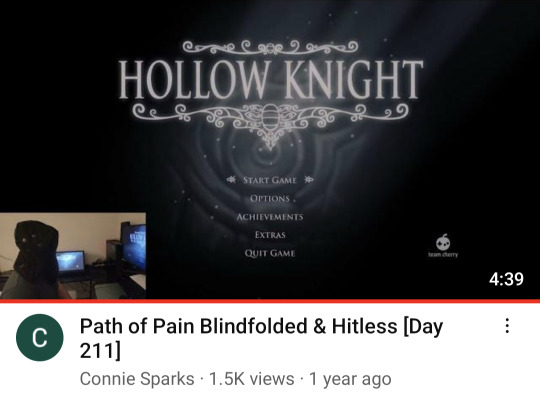
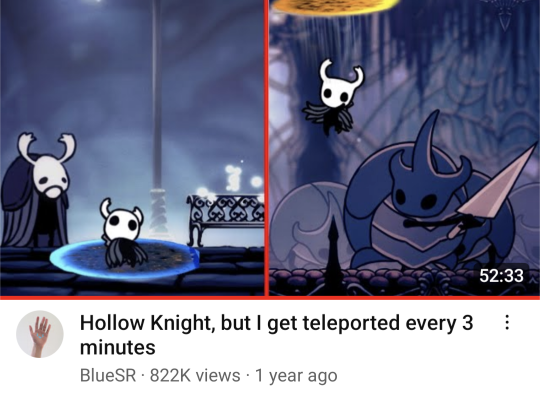
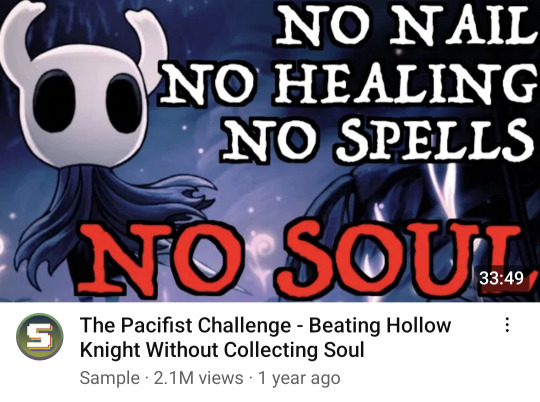

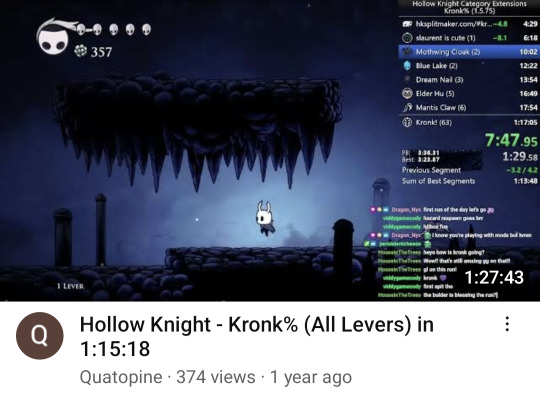
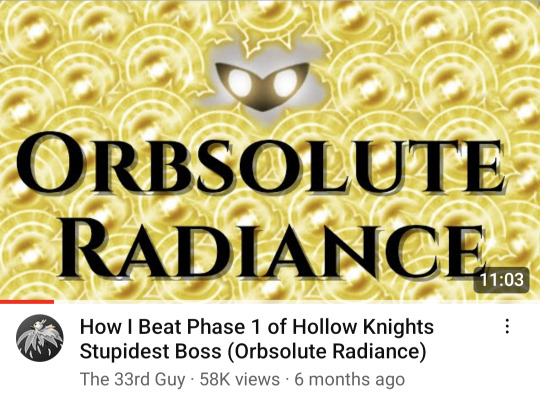
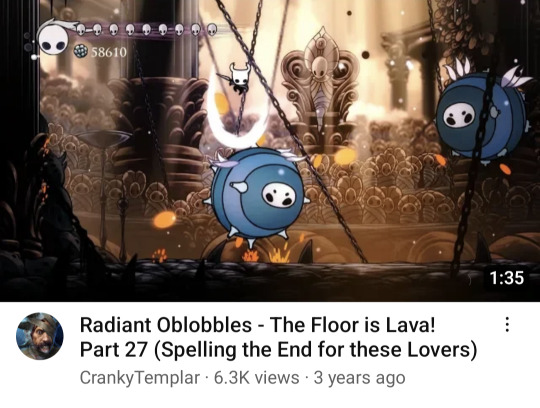
tfw no silksong
(links below the read more)
I Beat Path of Pain with a Guitar Hero Guitar by Mathulu
The Greatest Meme Speedrun by Skurry
Path of Pain but with 50 unkillable Primal Aspids chasing behind by fireb0rn
Hollow Knight - Kronk% (All Levers) in 1:15:18 by Quatopine
Path of Pain Blindfolded & Hitless [Day 211] by Connie Sparks
Hollow Knight, but I get teleported every 3 minutes by BlueSR
The Pacifist Challenge - Beating Hollow Knight Without Collecting Soul by Sample
Hollow Knight All Achievements NMG speedrun in 6:18:40 by Gusten
How I Beat Phase 1 of Hollow Knights Stupidest Boss (Orbsolute Radiance) by The 33rd Guy
Radiant Oblobbles - The Floor is Lava! Part 27 (Spelling the End for these Lovers) by CrankyTemplar
#anecdotes by peachdoxie#hollow knight#hollow knight silksong#silksong#there's actually a LOT more insanity that happens in the hk communities but not everything is on YouTube and i tried to feature a variety#edit: love how publishing this fucked up the format lmao#thousand notes
2K notes
·
View notes
Text
i will get published 🕯️ i will get published 🕯️ i will get published 🕯️ i will get published 🕯️i will get published 🕯️ i will get published 🕯️ i will get published 🕯️ i will get published 🕯️i will get published 🕯️ i will get published 🕯️ i will get published 🕯️ i will get published 🕯️i will get published 🕯️ i will get published 🕯️ i will get published 🕯️ i will get published 🕯️i will get published 🕯️ i will get published 🕯️
#writing#writer#creative writing#teen writer#author#author things#story writing#writers on tumblr#writeblr#manifesting#writing advice#writing prompt#on writing#writers#female writers#book writing#writer things#writer stuff#writers and poets#writerscommunity#writblr#publishing#author post#author thoughts#writing community#writing blog#writer problems#writing is my therapy#writerblr#writerscreed
468 notes
·
View notes
Text
This is the anti-marketing website, etc. etc. etc., but I've seen a couple of these posts do okay and it's Pride month so... Here goes?
Do ya wanna support a queer disabled author who is still slightly baffled that they broke into tradpub?
Do ya like stories about working class uprisings, set against a backdrop of corporate corruption and Superheroes Behaving Badly?
Do ya yearn for a plucky lesbian underdog of a hero, who becomes a supervillain sidekick while navigating her voracious horniness for both her grumpy butch coworker and her straight best friend (oddly specific, I know)?
Do ya want a murder mystery where we know the victim and the killer, but have to untangle the motive?
Do the descriptions "Laughed my butt off", "Me lesbeeb" and "Books that made me want to burn down the government" make you reach for your wallet?
If so, look no further than my debut, Strictly No Heroics!
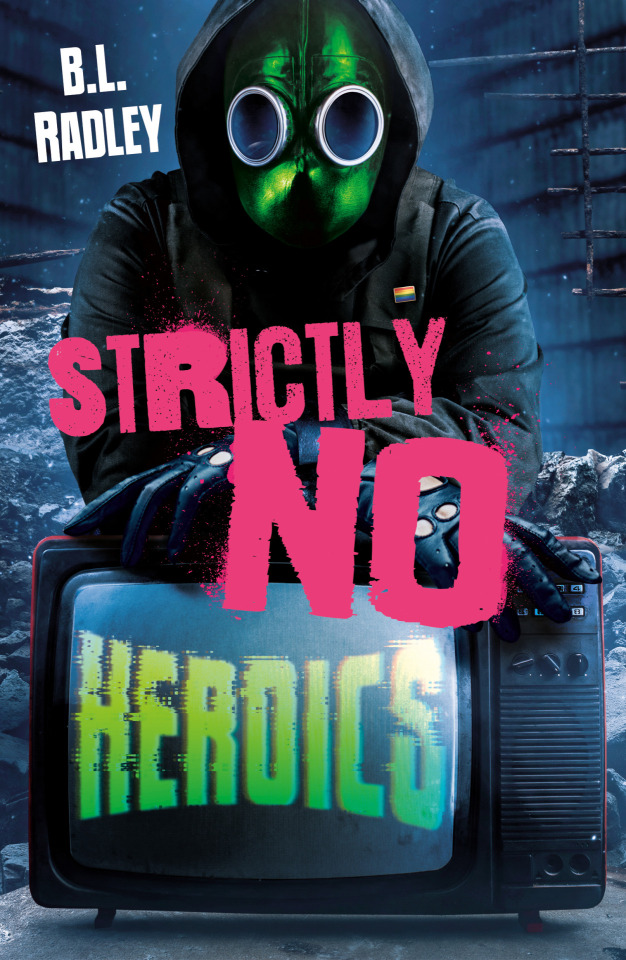
[ID: cover of a book showing a figure in a gasmask, hoodie and gloves, leant on an old TV. A rainbow pride pin is pinned to their jacket. Text reads ‘STRICTLY NO HEROICS’ in neon pink and green, and ‘B. L. Radley’ in white.]
Have an actual blurb too, while you're reading!
If you're a powerless normie in a world run by superheroes, you need three rules to survive:
1: Keep your head down
2: Don’t make enemies
3: STRICTLY NO HEROICS
When a hero gropes her best friend, Riley Jones breaks all of them.
Her attempt at serving justice gets her fired from her summer job. Luckily, Sunnylake City’s biggest business is booming (literally, when there's C4 involved).
Every villain wants henchmen: masked cronies who take their coffee orders, vacuum their secret lairs, and posture in the background while they fight. The HENCH agency provides a steady stream of drop-outs and losers who are willing to get beaten up for minimum wage.
Riley might just be the perfect candidate.
You can
buy my book here
UK version here
Reblogs are greatly appreciated, and kisses to everyone who's already got their hands on a copy!
#pride#queer#writers on tumblr#writers community#tradpub#creative writing#my writing#writeblr#my book#publishing
439 notes
·
View notes
Text

second attempt at posting thisuhh
#I think it wasn't published the first time#ten xfohv#eight xfohv#xfohv#object show community#osc#meisinas
276 notes
·
View notes
Text
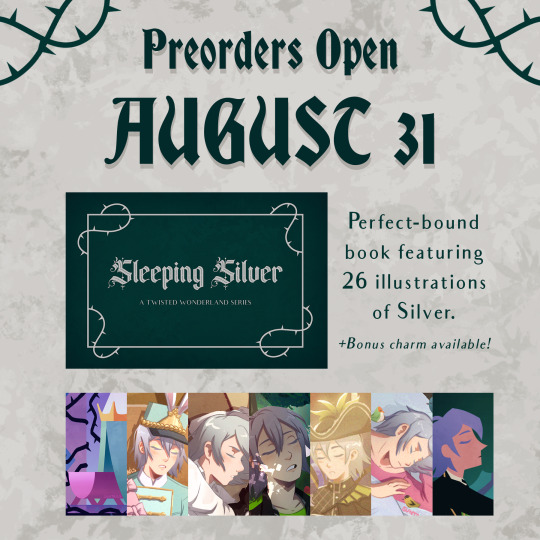
[sharing/rb appreciated 💛]
my silver artbook is FINISHED and will open for preorders on 8/31 at 12pm EST!! it's been almost 3 months of work and i'm so excited to finally be able to share all the art i've worked on, PLUS a small bonus charm!
if u know silver fans,,, tell them
#FINALLY! i'm finishing up setting the shop this week and orders will open on da weekend <3 couldn't be prouder than i'm doing it#i went back and found my first statement of wanting to draw this series and it was end of MAY and now here we are!!! hes REAL#ive always wanted to publish some sort of artbook or personal zine but showing unrelated pieces felt wrong i need it to be a PIECE#so this series was perfect. im making this book for all of us. silver fans must win we have to we must. but also. im making it for me#i love him so much i crave more work for him desperately so i feed myself. and i love the diasom community i love us i LOVE US!!!!#no crumbs. no. only a full meal. the finest i can offer. silver my son you are sleepy and wonderful and i love you dearly#twst#twisted wonderland#twst silver#diasomnia#silver vanrouge#if anyone has questions feel free to reach out however!! qs or dms or whatever. i got ur back <3#suntails
244 notes
·
View notes
Text
Doublethink sump linkdump
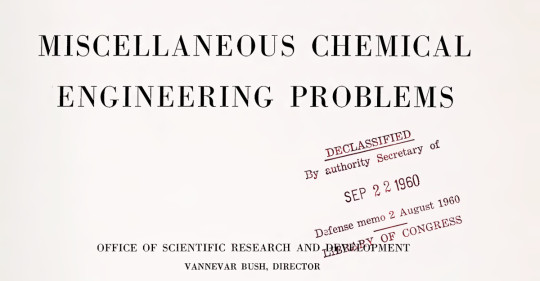
On OCTOBER 23 at 7PM, I'll be in DECATUR, presenting my novel THE BEZZLE at EAGLE EYE BOOKS.

Trigger warning for #eikositriophobia: this is my 23d linkdump (Hail Discordia!), an erratic Saturday purge of the open tabs I haven't managed to blog this week; here's the previous 22:
https://pluralistic.net/tag/linkdump/
When I was a kid, I idolized Harlan Ellison. I loved his prose styling, his stage presence, the way he blended activism and fiction, and the way he mixed critical nonfiction with fiction. As a 17 year old, I attended a writing workshop that Ann Crispin was giving at a local science fiction convention and she told me that I had the makings of a great writer, just as soon as I stopped trying to be Harlan Ellison.
But Harlan was a complicated figure. I attended the Clarion Workshop in 1992 specifically because he was our instructor, and came away bitterly disillusioned after he targeted one of my fellow students for relentless, cruel bullying, a performance that was so ugly that the board fired the director and permanently barred him from teaching the workshop.
Later on, Harlan became the kind of copyright maximalist who called for arbitrary internet surveillance and censorship in the name of shutting down ebook piracy. During a panel about this at a sf convention, he called one of the other panelists a "motherfucker" and threatened to punch him in the face. He took to badmouthing me in interviews, painting my position – whose nuances he certainly understood – in crude caricature.
But Harlan and I had many friends in common, people I really liked, and they were adamant that Harlan's flaws were not the whole story: if Harlan liked you, he would do anything to stand up for you, no matter the cost to himself. Famously, when Harlan taught Octavia Butler's Clarion, he demanded to know why she wasn't writing full time, and she replied that there was the inconvenient matter of making rent and groceries. He replied, "If that's all that's stopping you, come live in my guest house for as long as it takes, eat my groceries, and write." Which she did.
Which is great, but also: one of my own Clarion students told me about when his then-teenaged mother met Harlan at a sf convention and told him that she dreamed of becoming a writer, and he propositioned her. She was so turned off that she stopped writing forever (her son, my student, is now an accomplished writer).
So Harlan was a mixed bag. He did very, very good things. He did very, very bad things. When Harlan died, in 2018, I wrote an obit where I grappled with these two facts:
https://memex.craphound.com/2018/06/28/rip-harlan-ellison/
In it, I proposed a way of thinking about people that tried to make sense of both Harlans – and of all the people in our lives. There's an unfortunate tendency to think of the people that matter to us as having their deeds recorded in a ledger, with good deeds in one column and wicked deeds down the other.
In this formulation, we add up the good deeds and the bad deeds and subtract the bad from the good. If the result is a positive number, we say the good outweighs the bad, and therefore the person is, on balance, good. On the other hand, if the bad outweighs the good, then the person is bad, and the good deeds are irrelevant.
This gets us into no end of trouble. It means that when someone we admire slips up, we give them a pass, because "they've earned it." And when someone who's hurt us does something selfless and kind and brave, we treat that as though it doesn't matter, because they're an asshole.
But the truth is, no amount of good deeds can wipe away the bad. If you hurt someone, the fact that you've helped someone else doesn't make that hurt any easier to bear. And the kindnesses you do for other people make their lives better, no matter what bad things you've done to others.
Rather than calculating the balance of our goodness or badness, I think we should just, you know, sit with our sins and virtues. Let all the harm and joy exist in a state of superposition. Don't cancel out the harm. Don't wave away the good. They both exist, neither cancels the other, and we should strive to help more, and to do less harm. We should do everything we can to help those we harm. No one owes us a pass because of the good we've done.
That's the lesson Harlan taught me, and he taught it to me by absolutely failing to live his life this way – a fact that exists alongside all of the good he did, including the great art he made, which I love, and which inspired me.
Not long after Harlan's death, I got a phone call from J Michael Straczynski, Harlan's literary executor. As part of his care for Harlan's literary legacy, Joe was editing a new anthology of short stories, The Last Dangerous Visions, and did I want to contribute a story?
https://www.rollingstone.com/culture/culture-features/harlan-ellison-last-dangerous-vision-1235117069/
Of course I did. Harlan edited Dangerous Visions in 1967: a groundbreaking anthology of uncomfortable science fiction that featured everyone from Philip K Dick to Samuel Delany. The followup, 1972's Again, Dangerous Visions, was, if anything, even more influential, including Le Guin's The Word For World IS Forest, as well as work by Joanna Russ, Kurt Vonnegut, David Gerrold, and James Tiptree, Jr.
Though some of the stories in these books haven't aged well, together, they completely changed my view of what science fiction was and what it could be. But The Last Dangerous Visions was a different (ahem) story. For complicated reasons (which all cashed out to "Harlan being very difficult to work with, sometimes for damned good reasons, other times for completely petty ones), TLDV was, at the time of Harlan's death, fifty years behind schedule. It was "science fiction's most famous unpublished book." Harlan had bought early work from writers who had gone on to have major careers – like Bruce Sterling – and had sat on them for half a century.
Then Joe called me to tell me that he was starting over with TLDV and did I want to contribute a story – and of course I did. I wrote a story for him with the title "Jeffty Is Five," part of my series of stories with the same titles as famous works of sf:
https://locusmag.com/2012/05/cory-doctorow-a-prose-by-any-other-name/
Joe liked the story, but not the title. He thought Harlan wouldn't have approved of this kind of appropriation, and he wanted to do right by the memory of his old friend. My first reaction was very Harlan-like: this is supposed to make you mad, it's my art, and if it offends you, that's your problem.
But I remembered the most important lesson I learned from Harlan, about good deeds and bad ones, and I thought about Joe, a writer I admired and liked, who was grappling with his grief and his commitment to Harlan's legacy, and I changed my mind and told him of course I'd change the title. I changed the title because Harlan would never have done so, and that's rather the point of the story.The story is (now)) called "The Weight of a Heart, the Weight of a Feather" (a very Harlanish title), and it's about the legacy of complicated people, whose lives are full of noble selflessness *and careless or deliberate cruelty. It's about throwing away the ledger and just letting all those facts sit together, about lives that are neither washed of sin by virtue, nor washed of virtue by sin.
It's a good story, I think, and I'm proud of it, and I'm interested in what the rest of you think now that the book is out:
https://www.blackstonepublishing.com/products/book-fyhm
Harlan was the writer who made me want to get good at reading my stories aloud. I was a charter member of the Harlan Ellison Record Club, as you can see for yourself from the time Harlan (accidentally) doxed me:
http://harlanellison.com/text/paladin.txt
After nearly 20 years of podcasting, I'm actually pretty good at this stuff. I'm going to be podcasting a reading of this story – eventually. I am nearly done "de-googling" my podcast feed, ripping it out of Feedburner, a service that I started using nearly two decades ago to convert a WordPress RSS feed to a podcast feed. In the intervening years, WordPress has come to support this natively and Feedburner has become a division of Google, so I've been methodically removing Feedburner's hooks from my feed, which is now proudly available here, without any surveillance or analytics:
https://craphound.com/feeds/doctorow_podcast
I'll be writing up the process eventually. In the meantime, I'm about to embark on another podcast fiction project, serializing my novella Spill, a "Little Brother" story that Tor's Reactor just published:
https://reactormag.com/spill-cory-doctorow/
The first part of "Spill" will go out tomorrow or Monday. Reactor also just published another "Little Brother" story, "Vigilant," which I read in last week's podcast:
https://craphound.com/littlebrother/2024/09/29/vigilant-a-little-brother-story/
One of my long-running beefs with Harlan was his insistence that the answer of copyright infringement online was to create an obligation on intermediaries – like ISPs – to censor their users' communications on demand from anyone claiming to have been wronged by a post or upload.
This would be bad for free expression under any circumstances, but it's an especially dangerous vision for ISPs, who are among the worst-run, most venal businesses in modern society ("We don't care, we don't have to, we're the phone company" -L Tomlin).
It's hard to overstate just how terrible ISPs are, but even in a field that includes Charter and Comcast, there's one company that rises above the pack when it comes to being grotesquely, imaginatively awful: Cox Communications.
Here's the latest from Cox: they sell "unlimited" gigabit data plans that cost $100 for the base plan and $50 to add the "unlimited" data. But – as Jon Brodkin writes for Ars Technica – Cox uniquely defines "unlimited" as severely limited:
https://arstechnica.com/tech-policy/2020/06/cox-slows-internet-speeds-in-entire-neighborhoods-to-punish-any-heavy-users/
Now, you're probably thinking, ho-hum, another company that offered unlimited service and then acted like dicks when a customer treated it as unlimited, ::laughs in American Airlines::
https://www.forbes.com/sites/jamesasquith/2019/11/13/unlimited-first-class-flights-for-lifehow-american-airlines-made-the-most-expensive-mistake-in-aviation-history/
But that's not the Cox story! Cox doesn't just throttle "unlimited" customers' internet to 2006-vintage DSL speeds – they slow down the entire neighborhood around the unlimited customer to those speeds.
As Brodkin writes, every Cox customer in the same neighborhood as an "unlimited" customer named "Mike" had their upload speeds reduced by more than two thirds, from 35mbps to 10mbps, to punish Mike. And they're not the only ones!
https://www.reddit.com/r/GNV/comments/gkicjg/comment/fr670cx/
Cox confirmed they were doing this, saying "performance can be improved for all customers in the neighborhood by temporarily increasing or maintaining download speeds and changing upload speeds for some of our service tiers."
Cox has been on a roll lately, really going for the shitty-telecoms-company gold. Back in August, 404 Media published a leaked pitch deck in which Cox promised advertisers that they were secretly listening to their customers' smart devices, transcribing their private conversations, and using them to target ads:
https://www.404media.co/heres-the-pitch-deck-for-active-listening-ad-targeting/
This isn't just appalling, it's also almost certainly fraudulent. As terrible as "smart" devices are (and oh God are they terrible), the vast majority of them don't do this. That's something a lot of security researchers have investigated, doing things like hooking up a protocol analyzer to a LAN with a smart device on it and looking for data transmissions that correspond to ambient speech in earshot of the gadget's mic.
My guess is that Cox has done a deal with a couple of the bottom-feedingest "smart TV" companies (as a cable operator, Cox will have relationships with a lot of these companies) to engage in this conduct. Smart TVs have emerged as one of the worst categories of consumer technology, on every axis: performance, privacy, repairability. The field has raced to the bottom, hit it, and then started digging to find new lows to sink to. This is just my hunch here, but I think it's highly likely that if there's a class of devices that are bugging your living room and selling the data to Cox, it's gonna be a smart TV (top tip: buy a computer monitor instead, and use your phone or laptop to stream to it).
Ask a certain kind of very smooth-brained, Samuelson-pilled economist about the enshittification of smart TVs and they'll tell you that this is a "revealed preference":
https://en.wikipedia.org/wiki/Revealed_preference
As in, sure, you may say that you don't want your TV to secretly record your private conversations and sell them to Cox, but actually you quite like it, because you have a TV.
While this is a facially very stupid argument, it's routinely made by people who think they're very smart, a point famously made by Matt Bors's "Mr Gotcha":
https://thenib.com/mister-gotcha/
Comics turn out to be a very good medium for stringing up the revealed preferences crowd on their own petards. This week, Juan Santapau's "The Secret Knots" added to the Mr Gotcha canon with an equally brilliant webcomic, albeit one with a very different vibe, entitled "Remind Me Later":
https://thesecretknots.com/comic/remind-me-later/
Santapau really catches the zeitgeist with this one, which is more of a slow burn than a zinger, and which shows how online "revealed preferences" nonsense grooms us for the same bullshit in every corner of our lives, even our psychotherapist's office. Highly recommended – an instant classic.
"Revealed preferences" comes from the Chicago School of Economics, a field that decided that a) economics should be a discipline grounded in mathematical models; and b) it was impossible to factor power relationships into these models; so c) power doesn't matter.
Once you understand this fact, everything else snaps into focus – like, why the Chicago School loves monopolies. If you model an economy dominated by monopolists without factoring the power that monopolists wield, then you can very easily assume that any monopoly you discover is the result of a lot of people voluntarily choosing to spend all their money with the company they love best.
The fact that we all hate the monopolists we have to deal with is dismissed by these economists as a mirage: "sure, you say you hate them, but you do business with them, therefore, your 'revealed preference' shows that you actually love them."
Which is how we end up with absolutely outrageous rackets like the scholarly publishing cartel. Scholarly journals acquire academics' work for free; get other academics to edit the work for free; acquire lifetime copyright to those finished works; and charge the institutions that paid those "volunteer" academics salaries millions of dollars to access their publications:
https://pluralistic.net/2024/08/16/the-public-sphere/#not-the-elsevier
These companies don't just lock up knowledge and tie an anchor around the scientists' and scholars' ankles, dragging them down. Their market power means that they can hurt their customers and users in every way, including through rampant privacy violations.
A new study from SPARC investigates the privacy practices of Springerlink, and finds them to be a cesspit of invasive, abusive conduct that would make even a Cox executive blush:
https://zenodo.org/records/13886473
Yes, on the one hand, this isn't surprising. If a company can screw you on pricing, why wouldn't they scruple to give you the shaft on privacy as well? But The fact that a company as terrible as Springer can be the dominant firm in the sector is still shocking, somehow.
But that's terminal-stage capitalism for you. It's not just that bad companies companies thrive – it's that being a bad company is a predictor of sky-high valuations and fawning coverage from the finance press.
Take Openai, a company that the press treats as a heptillion-dollar money-printer whose valuation will eventually exceed the rest of the known universe. Openai has a lot of problems – a mass exodus of key personnel, a product that doesn't work for nearly all the things it's claimed as a solution to – but the biggest one is that it's a bad business.
That's the theme of a fantastic, characteristically scathing-but-deep Ed Zitron article called (what else?) "Openai is a bad business":
https://www.wheresyoured.at/oai-business/
Zitron does something that no one else in the business press does: takes Openai's claims about its business fundamentals – its costs, its prices, its competitors, and even its capabilities – at face value, and then asks, "Even if this is all true, will Openai ever turn a profit?"
The answer is a pretty convincing "no." Zitron calls it a "subprime AI crisis" in a nod to Tim Hwang's must-read 2020 book about the ad-tech bezzle, Subprime Attention Crisis:
https://pluralistic.net/2020/12/06/surveillance-tulip-bulbs/#adtech-bubble
The fascinating thing about both Zitron and Hwang's analysis isn't that there are big companies that suck – it's that they are able to suck up so much money and credulous excitement, despite how badly they suck.
That's where power – the thing that neoliberal economists say doesn't matter – comes in. Monopoly power is a self-accelerating flywheel, as Amazon's famous investor pitch explains:
https://vimeo.com/739486256/00a0a7379a
Once a monopolist or a cartel wields market power, they can continue to dominate a sector, even though they're very bad – and even if they use their power to rip off both their customers and very powerful suppliers.
That's the lesson of Michael Jordan's lawsuit against NASCAR, as Matt Stoller explains in his latest BIG newsletter:
https://www.thebignewsletter.com/p/michael-jordan-anti-monopolist
Jordan is one of the most famous basketball players, but after retiring from the game, he became a NASCAR owner, and as such, has been embroiled in a monopoly whose abuses are both eerily familiar to anyone who pays attention to, say the pharmacy benefit manager racket:
https://pluralistic.net/2024/09/23/shield-of-boringness/#some-men-rob-you-with-a-fountain-pen
But on the other hand, the fact this is all happening to race-cars and not pharmacies makes it very weird indeed. As with, say, PBMs, NASCAR's monopoly isn't just victimizing the individuals who watch racing, but also the racecar teams. These teams are owned by rich, powerful people (like Jordan), but are "almost always on the verge of bankruptcy."
Why is that? NASCAR rips them off. For example, teams have to buy all their parts from NASCAR, at huge markups, and the purchase contract prohibits them from racing at any rival event. There are a million petty schemes like this, and NASCAR carefully titrates its bleed-off to leave its victims almost at death's door, but still (barely) solvent enough to keep racing.
NASCAR also bought out all the rival leagues, and most of the tracks, and then locked the remaining tracks to exclusivity deals. Then the teams all had to sign noncompetes as a condition of competing in NASCAR, the only game in town – forever.
Hence Michael Jordan, a person who steadfastly refused to involve himself in politics during his basketball career, becoming a firebreathing trustbuster. Stoller cites Jordan's transformation as reason to believe that the anti-monopoly agenda will survive even in the event that Harris wins but bows to corporate donors who insist on purging the Biden administration's trustbusters.
That's a hopeful note, and I'd add my own to it: the fact that the NASCAR scam is so similar to the pharma swindles, academic publishing swindles, and all the other monopoly rip-offs means that there is a potential class alliance between university professors, NASCAR owners, and people with chronic health conditions and big pharmaceutical bills.
That high note brings me to the end of this week's linkdump! And here's a little dessert in case you've got room for one more little link: Kitowares "Medieval Mules", a forthcoming clog styled as trompe l'oeil plate armor:
https://www.kitowares.la/
Pair with old favorites like lycra armor leggings:
https://loricaclothing.com/collections/leggings-1/products/the-augsburg-legging
And a DIY crotcheted knight's helmet:
https://www.etsy.com/listing/590854477/knights-helmet-w-detachable-visor

Tor Books as just published two new, free LITTLE BROTHER s tories: VIGILANT, about creepy surveillance in distance education; a nd SPILL, about oil pipelines and indigenous landback.
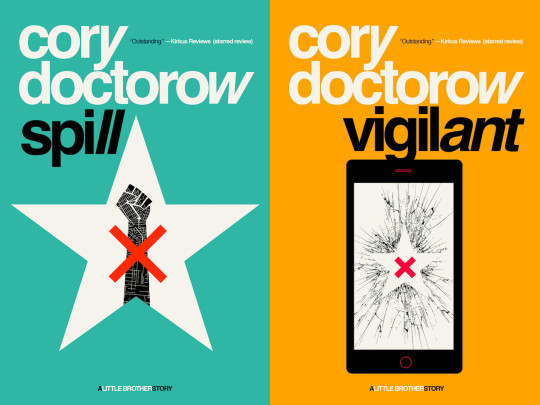

If you'd like an essay-formatted version of this post to read or share, here's a link to it on pluralistic.net, my surveillance-free, ad-free, tracker-free blog:
https://pluralistic.net/2024/10/05/farrago/#jeffty-is-five
#pluralistic#linkdump#linkdumps#open access#academic publishing#publishing#monopolies#springer#springer verlag#academia#libraries#glam#cox#collective punishment#ISP#telecoms#cox communications#openai#bubbles#bubblenomics#ed zitron#nascar#michael jordan#car racing#racing#shoes#fashion#medieval mules#harlan ellison#jms
174 notes
·
View notes
Text
Amazon are upping their print costs for books, which means some (possibly many) self-pubbed authors may have to also up the cost of their book(s). I'd like to say now, to make it crystal clear for the record, this is not authors being greedy.
I think someone who looks up the royalty rate for KDP and sees "60% for exclusive publishing and 40% for non-exclusive" would think "Wow, these authors are getting paid good money!" but once you calculate the amount of the list price that Amazon eats after printing costs, that percentage can be literally pennies. The minimum, and I mean the absolute bare minimum that I could sell When Dealing with Wolves for after the changes is £12.48 – and if I did that, I would make £0.00. That's zero money. No royalties.
I repeat: 40% royalties on a book listed at £12.48 = nothing.
I currently have WDWW up at £14.00. My "40% cut" from that is £0.76. After the printing cost changes go into effect, I'll make £0.61 from each sale instead. I really don't want to up my prices, because frankly it enrages me that Amazon won't let me list my book for anything under £12, when the standard price of a fiction paperback in the UK is usually around £8.99 – but writing isn't my priority job, so I have that luxury. I'm not trying to make a living off my writing so much as using it to supplement what I make from the freelance career, which is a choice I made because I knew I could never cope with the workload required for a ""serious"" self-pubbed writing career without sabotaging myself. The £0.15 difference in royalties from one book sale isn't going to be the difference between me eating or not; it just really really annoys and disheartens me. (And, also, is further proof that I can't sustain a full-time writing career, because I'd run myself ragged for too little gain and then I wouldn't be able to eat).
But there are plenty of authors who are writing as their primary source of income, either because they can't do anything else or because they took the plunge they're building their career (and it shouldn't matter to you why someone is writing full-time, by the way. You want fiction media to interact with, then you need writers, and writers need to be paid in order to live in order to make more media). It's these authors who will have to up their book prices, and I feel in my bones that it's these authors who are going to face the backlash.
So, if you must be pissed off at someone, be pissed off at Amazon. The authors are probably pissed off, too (I certainly am!), so you'll be in good company.
(And if you can, buy the ebook version because we get better royalties, or see if the author has their own store where you can get the book, since they'll have more control over their own prices there).
#this is okay to reblog btw#i am venting but also royalty talks are something that's important for writer communities to have#writeblr#self publishing
1K notes
·
View notes
Note
May I ask the software you use to write?
Congratulations on getting so much done!
Thank you so much. And, of course.
I use the Reedsy Book Editor for all of my writing projects, and I've been using it for about three years now. I also have experience with other amazing softwares, and I would love to create more tutorials on them if you need me to.
Here's a quick tutorial on how to use the Reedsy Book Editor.
When you visit the website, the first thing you'll come across is this page. It's a completely free writing tool with a fantastic interface. All you need to do is sign up with your Google or Facebook account.
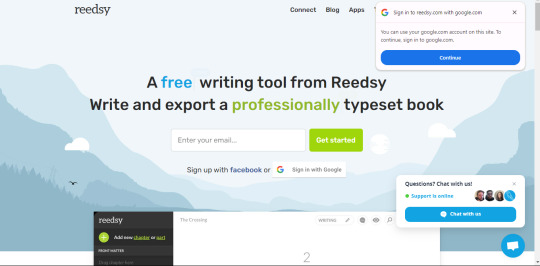
After you've completed the sign-up process and provided some information about yourself, you will be directed to this page. Please locate the "Books" option in the website's header.
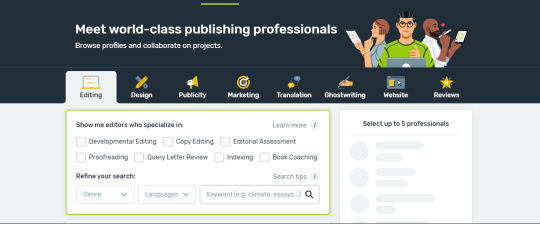
Feel free to give your book/WIP (Work in progress) a title. Remember, it's okay if it's not your final title, as you can always change it in the settings of your book later.
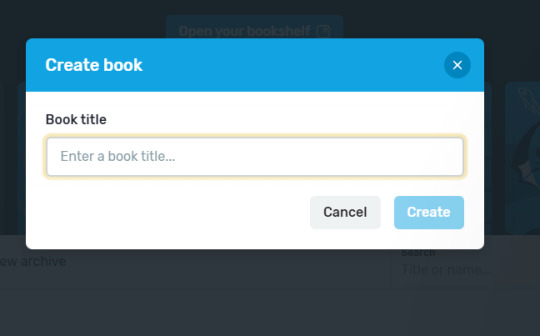
Once you've created it, you can take your time and when you're ready, you can click "Write.”
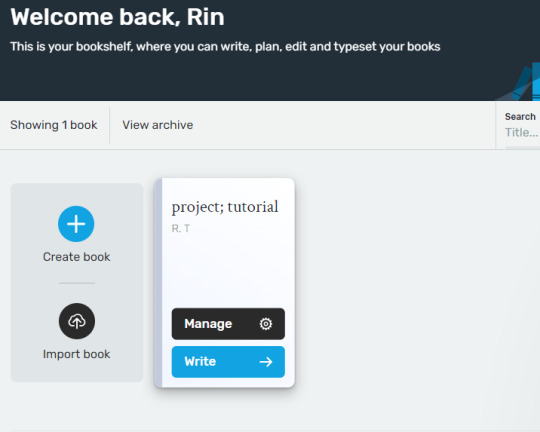
Once you click "Write," you'll be directed to the next page. There, you'll find your chapters, the space to write your manuscript, and a sidebar with various helpful features provided by Reedsy.
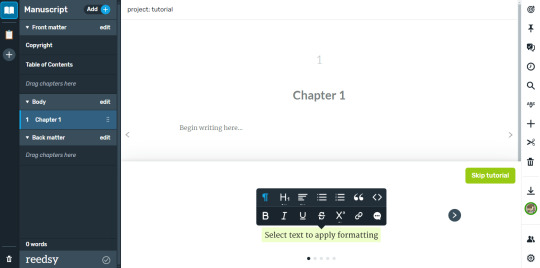
Then, you can choose any name for your chapter that feels meaningful to you.
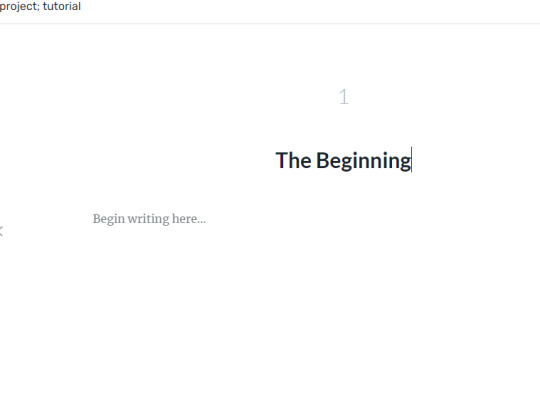
You can also track your writing goals for your specific manuscript or book. This feature provides insights into your writing habits, such as the days you've written and the number of words you've written. You can also set a target word count goal for the manuscript, and you also have the option to set manual writing goals. Additionally, you can check the word count in your current chapter from the bottom of the widget.
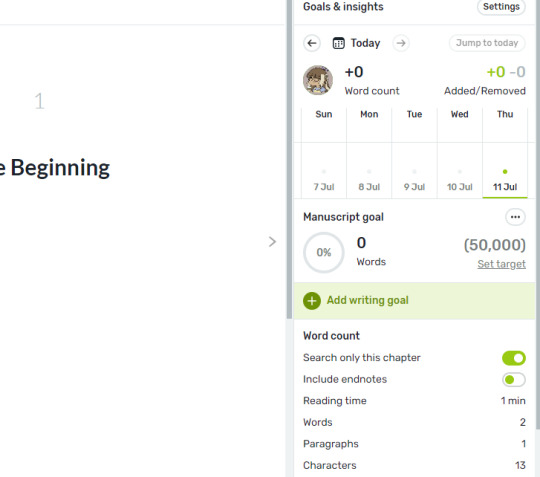
You have the option to set a deadline and choose the days that work best for you to write. This will help Reedsy estimate a realistic word count goal for you.
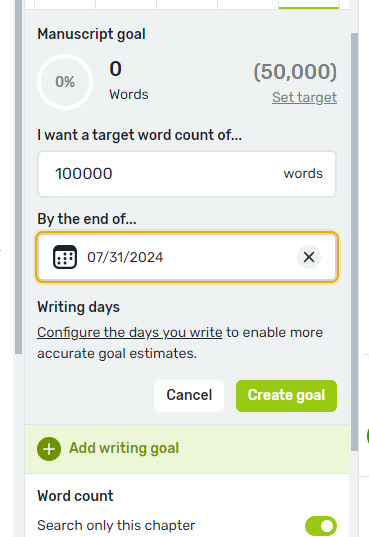
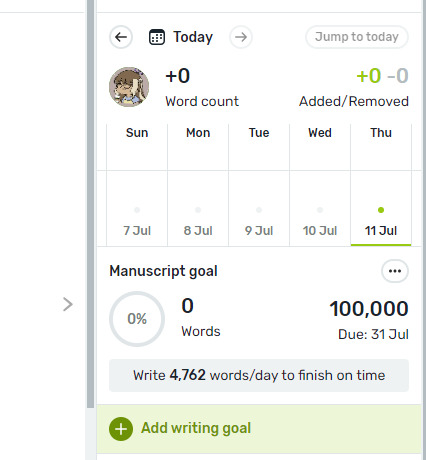
Remember that on Reedsy, there's a new beta feature that allows you to plan and outline your novel without having to leave the website. It offers note cards for you to jot down the plot and scenes from your novel, which can serve as a helpful guide and provide a simple outline to support your writing process.
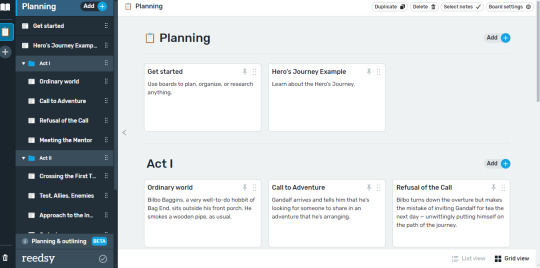
Also, don’t forget the various features available to you when creating your book in Reedsy. For instance, you have the option to include preset formatted pages such as a dedication page and an epigraph that resonates with your story. These features can add a lot of value to your book, and I encourage you to explore them further.
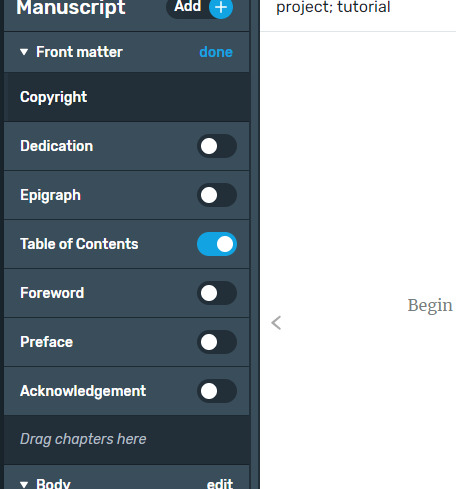
Hopefully this can help you understand the basics of Reedsy Book Editor. One of my favorite writing softwares that is completely FREE!
Hey fellow writers! I'm super excited to share that I've launched a Tumblr community. I'm inviting all of you to join my community. All you have to do is fill out this Google form, and I'll personally send you an invitation to join the Write Right Society on Tumblr! Can't wait to see your posts!
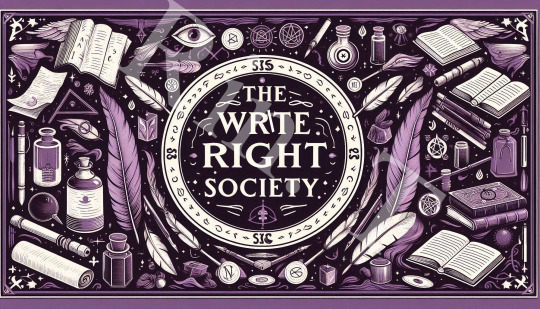
#writeblr#creative writing#thewriteadviceforwriters#writers on tumblr#writer things#writing#writing tips#on writing#writer#writer community#writing tools#writing resources#writing blog#writing advice#fiction writing#novel writing#author#book writing#publishing#indie author#fiction#reedsy#book editor#bookblr#self concept#bookworm#bookstore#books and reading#reading#book quotes
174 notes
·
View notes
Text

476 notes
·
View notes
Text

from dawn song for the gutter, at dusk, by silas denver melvin, published in issue five of body fluids
#silas denver melvin#sweatermuppet#poetry#modern poetry#dawn song for the gutter at dusk#published poet#poetblr#poetry community#original writing#writers on tumblr#contemporary poetry
183 notes
·
View notes
Text
I feel like I should say since there's been a recent uptick in a lot of communities I'm in/see stuff from a lot of white people pretending to be Asian, but you are not welcome here if you are in anyway stealing from Asian cultures for clout or the aesthetics of it
This includes if you're white and you give your self inserts Asian names, I truly do not care if your f/o is from an anime, you should not be using an Asian name under any circumstances. I hate that whenever I see someone using an Asian name online, I feel like I have to start searching their account to see if they're actually Asian or just a white person who likes the aesthetic of it bcs far too many white people will use Asian names here just bcs it sounds cool, with no regard for the actual cultural meaning behind it. Meanwhile actual Asian people will be mocked for their names, or treated like their names are too hard to learn to pronounce, or discriminated against based on their names
Asian cultures are not a fun little costume for people to dress up with. They aren't just a nice aesthetic, they aren't just a thing you can borrow from bcs you think it sounds cool
#my posts#selfship community#anti asian racism#like it's definitely a perpetual problem of white people not seeming to realize asian names are like#a thing that are tied to culture and identity#but it's gotten crazy lately with people pretending to be asian online for clout#just in the past like 3 weeks of things i've seen#we had the white woman pretending to be a japanese woman on comic twitter#the white woman who pretended to be korean to get a 'ownvoices' book published#(who btw. named herself kim chi. you cannot make this shit up)#and then the white guy pretending to be japanese to try to justify his hate of the new assassin's creed game using stuff around yasuke#like it's so draining. i hate how much this is a never ending problem#i hate how casually white people will use asian names#like worstie. i am a korean woman. but i am whitepassing and mixed so i never use korean names for my self inserts#bcs i have the privilege of looking white and people generally only knowing i'm asian if i say it#it feels inappropriate to me for me to name my self inserts a korean name#bcs that would then mean they experience the world in a different way than i do#even being whitepassing bcs of the way people treat korean (and other asian) names#if you are white you have no fucking right to asian names#idgaf if your f/o's an anime character. stay away from asian names bcs they are not yours to dress up in#vent a little bit sorry team#i've been dealing with white people doing this shit and being assholes to me about it for well over a year now. it's exhausting
189 notes
·
View notes